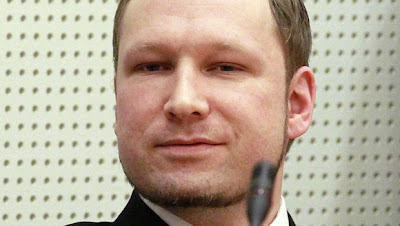 |
| A sneer, micro or macro, is the universal expression of contempt |
Is he insane? This was the central question the recent trial revolved around. Prosecutors want him to be insane, even though they now admit their doubt on the subject. Prosecutor, Svein Holden, is quoted by the BBC as stating, "We are not convinced or certain that Breivik is insane but we are in doubt." And yet, they continue to argue he should not be imprisoned but should instead be committed to a psychiatric institution.
Here, insane is more or less defined as psychotic. Is he psychotic (insane) or psychopathic (sane but very very bad)? That is the question. Technically the defense is on a fool's mission to explain his actions as justified, but that is beyond absurd. One wonders if the defense attorneys have undergone cognitive deficiency testing themselves--if not, perhaps they should. While there is little if any evidence of actual psychosis there is a strong desire to place Breivik in that category, or maybe more to the point, to place him outside the categories of normal or sane.
Other than the fact that Norway has one of the most lenient and forgiving criminal justice systems on the planet, I know too little of that place and culture to fully understand their reasoning. I can only surmise it gives some comfort to hold a belief that a man capable of doing what Breivik did cannot be normal or sane. In a lay sense, what Breivik did makes him, by definition, insane. This creates a safe psychological boundary between him and us.
It is an understandable sentiment, I'm sure. But what does it say about a criminal justice system where prosecutors are not motivated by truth but by the outcome that makes them the most comfortable?
Can a man like Breivik be helped by psychiatric care? If he were in fact psychotic, there are drugs that may (or may not) help. Add some cognitive-behavioral whatnot and sometimes we see improvement, even dramatic improvement at times. Conversely, if he is a straight up psychopath (as is likely the case), there is very little help possible if we want to be honest about it.
The Norwegian prosecutors fail to recognize the collateral impact of their strategy is to add more fear and stigma to the actual insane, the 1% or so of the world's population with a form of psychosis at some point in their lives. Granted there have been plenty of psychotic shooters and killers over the years, and we may very well have experienced another one in Colorado just this month, but the vast majority of people with psychotic experiences, 1% of the world's population, are as non-violent as anyone else. Some psychotic individuals can be dangerous, but lets not pin everything too horrific to comprehend on them just to make us feel a little more removed from the human potential for evil.
